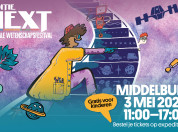Zoeken
Filteren op
Type
Labels
Dossiers
Thema's
Afdelingen
Taal
Active filters
1721 zoekresultaten
Zoekresultaten
-
Word burgerwetenschapper voor Vang de Watermonsters
Natuur & Milieu en het Nederlands Instituut voor Ecologie (NIOO-KNAW) organiseren voor de vijfde keer Vang de Watermonsters: word ook burgerwetenschapper.
-
Expeditie NEXT: bodemdierendoolhof op kinderwetenschapsfestival
Op woensdag 3 mei 2023 organiseert de Nationale Wetenschapsagenda (NWA) de derde editie van Expeditie NEXT: hét Nationale Wetenschapsfestival voor kinderen. Ook het NIOO is hier aanwezig met het bodemdierendoolhof en je kunt zelf een wormenboerderij maken.
-
Jos Raaijmakers elected member of the KNAW
NIOO's head of Microbial Ecology Jos Raaijmakers has been elected a member of the Royal Netherlands Academy of Arts and Sciences (KNAW).
-
Jos Raaijmakers benoemd tot lid KNAW
Jos Raaijmakers, hoofd Microbiële Ecologie van het NIOO, is benoemd tot lid van de Koninklijke Nederlandse Akademie van Wetenschappen.
-
Beleef de Lente (6): Tja...
Beleef de Lente biedt een unieke kijk op het wel en wee van vogels tijdens hun broedseizoen. Ook de mezen doen weer mee.
-
Onder het Maaiveld Junior: een magisch ondergronds avontuur
De makers van de succesvolle bodemfilm Onder het Maaiveld hebben een versie gemaakt voor kinderen. Onder het Maaiveld Junior draait deze meivakantie in de bioscoop.
-
Hackfort
Hackfort is an oak coppice grove in the East-Southeast of the city of Zutphen in the province of Gelderland, the Netherlands. The forest is situated at the transition from western riverine deposits and eastern periglacial cover sands.
-
Galápagos (3): Back home and prepping for data analysis
An international research team led by the Netherlands Institute of Ecology (NIOO-KNAW) has been searching for invisible life in the iconic Galápagos Islands. Part three.
-
Galapagos (3): Weer thuis
Een team onderzoekers geleid door het NIOO was op de iconische Galapagos eilanden. Hun doel: Scalesia, het unieke reuzenmadeliefje, en de micro-organismen die erbij horen. Op deze plek bloggen ze. Deel drie.
-
Beleef de Lente (5): Witkopje
Beleef de Lente biedt een unieke kijk op het wel en wee van vogels tijdens hun broedseizoen. Ook de mezen doen weer mee.
